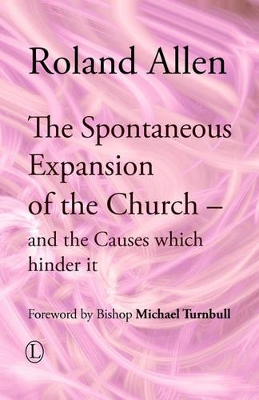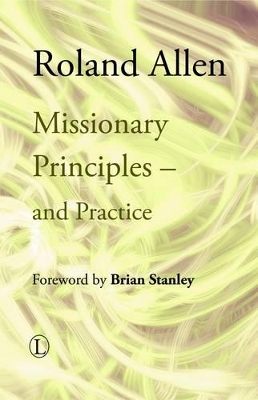Roland Allen Library
4 total works
If it were once believed that the freedom of churches should be restricted to bring greater control to missions, Roland Allen sets out to overturn this conception. Warning against the danger of imposing greater limits on churches, the Author advocates that all members of the church, 'natives' and foreigners alike, must take an active role in its establishment and daily life. The study divides itself into nine chapters; the first, introducing Allen's standpoint, the second as an opening into the nature and character of Spontaneous Expression. The third chapter deals with modern attempts by 'natives' towards the liberty of their churches. The fear of the doctrine becoming weakened by natives taking it into their own hands is addressed by chapter four and this fear is widened into the realm of the Christian standard of morals in chapter five. Civilisation and enlightenment form the central themes of the sixth chapter. Chapters seven and eight tackle the distinction between the Church and missionary societies.
It is in the final chapter that the future of Spontaneous Expansion is investigated and Allen puts forward his ideas which, as he rightly predicted, were broadly accepted fifty years and longer still after their original publication.
It is in the final chapter that the future of Spontaneous Expansion is investigated and Allen puts forward his ideas which, as he rightly predicted, were broadly accepted fifty years and longer still after their original publication.
Within a decade, St. Paul established the Church in the four provinces of Galatia, Macedonia, Achaia and Asia. This informative study focuses on the social background to the Apostle's missionary journeys with comparisons between his methods and those of the modern day. The book divides into five parts; the first examines the social and religious world which the Apostle inhabited in AD 50; the second addresses how St. Paul presented the Christian Gospel and his financial policy of self-support for the new churches. Here, contrasts are made between St. Paul's financial and missionary principles, which differ alarmingly from those of the nineteenth and twentieth centuries. The rapidity of the Apostle's appointment of responsible church leaders is sharply contrasted with the slowness of the present in the third part. Part four deals with St. Paul's procedures for authority in churches, where those of the present day fail to address the conscience of the local church. Conclusions are provided in part five and the clarity and vigour of Allen's style ensures the reader's interest is maintained to the end. 'Many missionaries in later days have received a larger number of converts than St.
Paul; [...] but none have so established churches. We have long forgotten that such things could be.' Extract from Chapter One.
Paul; [...] but none have so established churches. We have long forgotten that such things could be.' Extract from Chapter One.
Roland Allen is internationally renowned for his controversial solutions to dilemmas within churches and missions. His works were first written in the first decade of the twentieth century, yet their ideas are so radical that they are still relevant today. Indeed, Allen predicted that his principles would not be broadly accepted until around fifty years after their creation. This selection of works by this mission pioneer and creative thinker takes extracts from Allen's other writings, which although having potential to be just as influential as those better known, have long been out of print. It is now the present-day reader's chance to investigate the theories within texts such as: Pentecost and the World, Non-Professional Missionaries, Mission Activities Considered in Relation to the Manifestation of the Spirit, St. Paul and the Judaizers: A Dialogue, An Illustration from V.S. Azariah, The Case for Voluntary Clergy and To the Parishioners of Chalfont St. Peter. Throughout all of these writings is Allen's central belief that the Holy Spirit is in the Church everywhere.
This selection of texts makes an ideal accompaniment to Allen's significant works on missionary methods and principles, including Missionary Methods: St Paul's or Ours?, Missionary Principles and The Spontaneous Expansion of the Church, all of which have been reprinted by The Lutterworth Press.
This selection of texts makes an ideal accompaniment to Allen's significant works on missionary methods and principles, including Missionary Methods: St Paul's or Ours?, Missionary Principles and The Spontaneous Expansion of the Church, all of which have been reprinted by The Lutterworth Press.
First published in 1913, Missionary Principles is a classic textbook by genre, but in its controversial evaluation of the Church's missionary theories, it is by no means wholly traditional. At the centre of this discursive study, Allen asserts the distinction which needs to be made in missionary aims between the extension of the Church and the preaching of Jesus Christ. The book is divided into four major chapters, entitled: The Impulse, The Hope, The Means and The Reaction. The impulse, hope and means of missionary work can all be embodied by Jesus Christ, who is viewed as the source, the end and the worker. It is always with this objective in mind that Allen guides the reader through Christ's wishes as to how the Word should be spread. In the final chapter, Allen examines the results of believing in the Holy Spirit's inspiration and the effects this has on the missionary's understanding of moral purpose and motive of missions, both at home and overseas. "It is not the same thing to seek the manifestation of Christ in the growth of the Church, and [...] the effect of that upon all missionary work is most profound." From Chapter Two: The Hope



